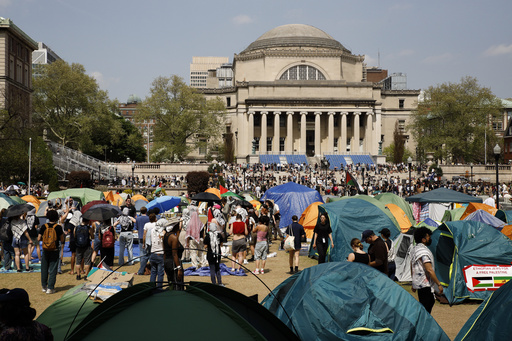Columbia University is preparing to resume classes amidst expectations of renewed pro-Palestinian protests that occurred at the end of the previous semester, igniting demonstrations at colleges nationwide. The university’s new leadership has been engaging in dialogue sessions to ease tensions, released a report on campus antisemitism, and introduced protest guidelines to manage disruptions. Despite these efforts, student organizers are determined to escalate their actions until the university severs ties with companies linked to Israel.
Following the departure of Columbia’s president, Minouche Shafik, the interim president, Katrina Armstrong, has been meeting with students from both sides to uphold free expression while ensuring a safe learning environment. The possibility of significant disruptions looms, with faculty members expressing concerns about returning to a state of lockdown similar to the previous spring.
A recent report from a task force at Columbia criticized the university for allowing antisemitism to persist on campus and suggested reforms to address the issue. Demonstrations against the war have started to emerge on campuses this semester, with the University of Michigan witnessing multiple arrests. Signs of previous unrest are already noticeable near Columbia, with enhanced security measures in place including guarded gates and private security patrols on campus.
Students on campus have expressed mixed feelings about the security measures, with some considering them unwelcoming distractions, while others believe the university has been too lenient towards student protesters. There have been ongoing disciplinary cases, with some charges dropped against students arrested last semester. Columbia faced a lawsuit from Jewish students over creating an unsafe environment on campus and has implemented measures such as providing a “safe passage liaison” for concerned individuals.
The university has updated its protest guidelines and introduced new training on antisemitism and Islamophobia for incoming students. There is an ongoing debate on the definition of antisemitism and whether anti-Zionist speech should be categorized as discrimination. Similar issues are being discussed at New York University following protests there last spring.
As the new semester begins, instructors are navigating uncertainties about discussing sensitive topics like the Gaza conflict on campus. Despite the current calm atmosphere, there are concerns that tensions could quickly escalate once again. Columbia University is bracing for a challenging academic year as it navigates complex issues of free speech, activism, and campus security.



